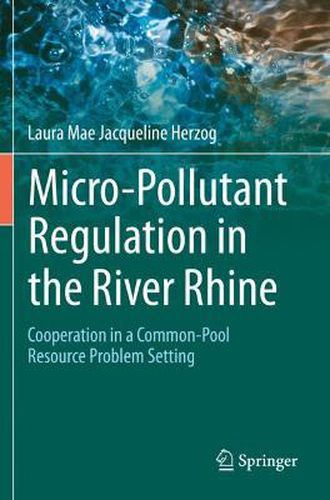Readings Newsletter
Become a Readings Member to make your shopping experience even easier.
Sign in or sign up for free!
You’re not far away from qualifying for FREE standard shipping within Australia
You’ve qualified for FREE standard shipping within Australia
The cart is loading…






This title is printed to order. This book may have been self-published. If so, we cannot guarantee the quality of the content. In the main most books will have gone through the editing process however some may not. We therefore suggest that you be aware of this before ordering this book. If in doubt check either the author or publisher’s details as we are unable to accept any returns unless they are faulty. Please contact us if you have any questions.
This book investigates how actors organize in order to solve a water quality problem. Research on the use of environmental resources has mainly focused on the circumstances needed for users to self-organize or to maintain an already sustainable way of resource use. Few studies have investigated the reasons why actors start to cooperate when they are faced with an environmental problem. Actor networks in three regions of the Rhine catchment area are scrutinized regarding a) actors’ cooperation pattern when managing an environmental problem; and b) the factors that trigger actors in a common-pool resource situation to initiate cooperation. Water quality policy is analysed in two European countries - Germany and Luxembourg - and one non-European country - Switzerland -, providing an overview of the distinctive measures applied in these regions aiming to tackle the water quality problem of micro-pollutants in river surface water. Applying the social-ecological system framework (SESF) devised by E. Ostrom and her colleagues and Social Network Analysis (SNA), the current book combines qualitative and quantitative methods to answer the question of why actors cooperate in the management process of an environmental problem like water pollution.
$9.00 standard shipping within Australia
FREE standard shipping within Australia for orders over $100.00
Express & International shipping calculated at checkout
This title is printed to order. This book may have been self-published. If so, we cannot guarantee the quality of the content. In the main most books will have gone through the editing process however some may not. We therefore suggest that you be aware of this before ordering this book. If in doubt check either the author or publisher’s details as we are unable to accept any returns unless they are faulty. Please contact us if you have any questions.
This book investigates how actors organize in order to solve a water quality problem. Research on the use of environmental resources has mainly focused on the circumstances needed for users to self-organize or to maintain an already sustainable way of resource use. Few studies have investigated the reasons why actors start to cooperate when they are faced with an environmental problem. Actor networks in three regions of the Rhine catchment area are scrutinized regarding a) actors’ cooperation pattern when managing an environmental problem; and b) the factors that trigger actors in a common-pool resource situation to initiate cooperation. Water quality policy is analysed in two European countries - Germany and Luxembourg - and one non-European country - Switzerland -, providing an overview of the distinctive measures applied in these regions aiming to tackle the water quality problem of micro-pollutants in river surface water. Applying the social-ecological system framework (SESF) devised by E. Ostrom and her colleagues and Social Network Analysis (SNA), the current book combines qualitative and quantitative methods to answer the question of why actors cooperate in the management process of an environmental problem like water pollution.